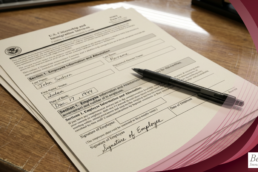On February 2, 2024, the Department of Homeland Security (DHS) published a final rule to improve the H-1B registration selection process and program integrity. This final rule aims to streamline the process while enhancing accountability and ensuring the accuracy of beneficiary information. One of the most notable changes is the shift towards a beneficiary-centric approach, where registrations are selected by unique beneficiary rather than by individual registration. U.S. Citizenship and Immigration Services (USCIS) will require registrants to provide valid passport information or valid travel document information for each beneficiary.
Beneficiary-Centric Process
Under the final rule, registrations for the H-1B program will now be selected by unique beneficiary rather than by individual registrations. This change aims to simplify the process and reduce the administrative burden on both applicants and immigration authorities.
Valid Passport or Travel Document Requirement
A significant requirement of the new rule is the necessity for a valid passport or travel document during the registration stage. Each beneficiary must be registered under only one passport or travel document, ensuring clarity and accuracy in the registration process. An expired passport or expired travel document that has not been extended is not considered valid. It’s crucial that the passport or travel document listed in the registration corresponds to the passport or travel document the beneficiary intends to use to enter the United States, if or when the beneficiary is abroad.
Facial Expiration & Automatic Extensions
In rare cases, such as for nationals of certain countries like Venezuela, the passport or travel document may be past the expiration date listed on the document (i.e., facially expired) but may have had its validity extended by decree or automatically by the national government or issuing authority that issued the passport or travel document. In such instances, these documents will be considered valid since they were extended by decree or automatically. Registrants should enter the expiration date of the passport or travel document based on the extension, not the date listed on the document itself. If an H-1B petition is filed based on such registration, USCIS will review the copy of the facially expired document along with any relevant information about the extension to ensure the information entered at registration was accurate.
Passport Expiration between Registration & Filing
Another important consideration is the validity of the passport or travel document at the time of registration and filing. The passport or travel document must be valid at the time of registration. Thus, if the passport or travel document expires between when a registration is submitted and when the H-1B petition is filed, the petitioner must update the information with data from the new, currently valid passport or travel document on Page 3 of Form I-129, Petition for Nonimmigrant Worker. In support of the H-1B petition, the petitioner should provide documentation for both passports or travel documents to establish that the passport or travel document was valid at the time of registration and an explanation as to why there was a change in identifying information.
Addressing Extenuating Circumstances
Registrants facing any other extenuating circumstances, the registrant will have an opportunity during the registration process to provide a brief explanation as to why the beneficiary does not have a valid passport or travel document.
Conclusion
The final rule on the H-1B registration process represents a significant shift towards a beneficiary-centric approach aimed at improving program integrity and streamlining procedures. By requiring valid passport or travel document information and addressing various scenarios, the rule aims to enhance accountability and ensure the accuracy of beneficiary data. It’s essential for employers and beneficiaries to familiarize themselves with these requirements to navigate the H-1B registration process effectively.
For additional information and details about the registration process, applicants can visit H-1B Electronic Registration Process | USCIS. Understanding and adhering to these guidelines will be crucial for a smooth and successful H-1B registration process in the future.
If you have any questions about FY2025 H-1B registrations, contact our office today to set up a consultation with one of our attorneys!
Ready to have Berardi on your side?
Whether you’re a business looking to hire or a professional hoping to relocate, immigration law can be complicated. But you don’t have to do it alone. Put our experience to work for you.



